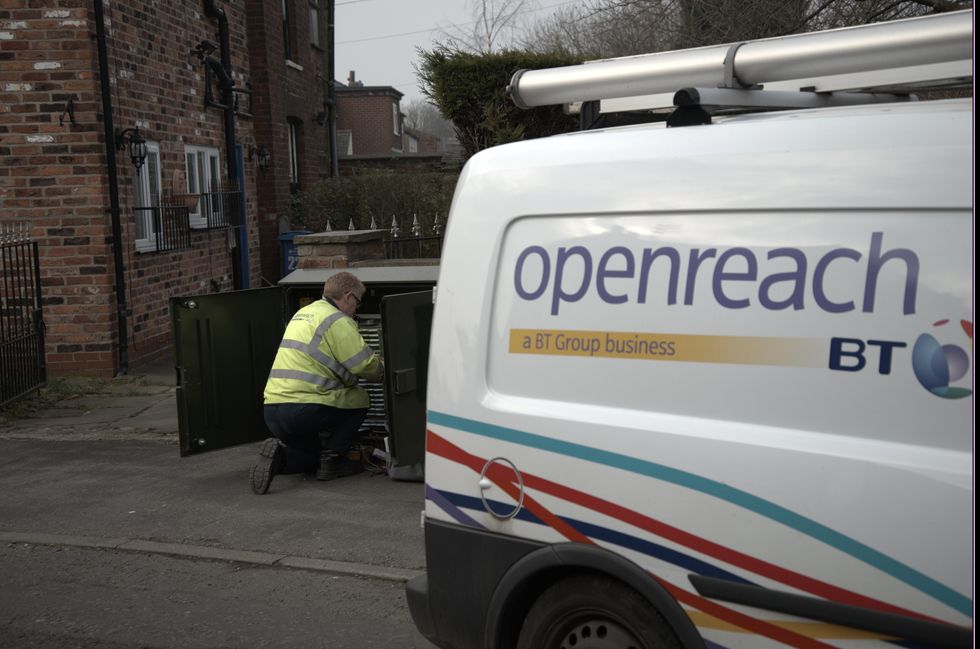Your BT, Sky, Virgin Media, TalkTalk broadband bills increase NOW — these 3 steps could save you money

From April 1 onwards, you can expect broadband bills to increase from all major providers
|GETTY IMAGES | GBN

All products and promotions are independently selected by our experts. To help us provide free impartial advice, we will earn an affiliate commission if you buy something. Click here to learn more
Your billing date will determine the exact time this month when the price hike kicks-in
- Throughout April, most broadband firms will increase monthly bills
- The exact amount varies based on when you signed up for your contract
- Some customers will see bills increase based on a measure of UK inflation
- However, Ofcom has outlawed this practice for new subscribers
- If you joined more recently, you'll see broadband bills increase by a flat fee
- Price hikes will add between £22 – £42 annually, research suggests
- Extra costs will be applied to your next billing date this month
- However, there are steps you can take to cut these costs
- Millions could be missing out on lower broadband bills, Ofcom data shows
Don't Miss
Most Read
Latest
Brace yourself — monthly broadband bills are set to increase from this month, as major UK internet suppliers implement their annual price hikes. Some of the most popular broadband providers — BT, Sky, TalkTalk, Plusnet, EE, Vodafone, and Virgin Media — have confirmed plans to increase monthly bills for existing subscribers in April.
How much extra will you have to pay? That depends on the broadband supplier that you use, and when you signed up for the contract. Yes, the annual round of price hikes is more complicated than usual, thanks to the introduction of new rules from Ofcom governing how UK broadband providers can increase bills mid-contract.
Some customers will see monthly costs rise in line with inflation, while others could face fixed hikes.
For those on the older, inflation-linked contracts, broadband prices will rise by an average of £21.99 annually, with some newer plans seeing increases of up to £42 a year, according to analysis by Uswitch.
Stuck in your current contract? EE will pay £300 towards leaving fees

...and that's not all. For a limited time, EE is offering free broadband for the first 3 months of your contract. Available on full-fibre packages starting from £32.99, which unlocks the Full Fibre 150 plan, up to the all-singing, all-dancing Made For Gamers package with the new Wi-Fi 7 hub included as standard.
If you're still within the minimum contract term, there's not much you can do to swerve these price rises. Some broadband providers — Vodafone and EE, to name a couple — contribute between £100 - £300 towards early termination fees when you agree to switch from your current contract.
- Start your switch to Vodafone, and claim up to £100 to cover early termination fees
- Start your switch to EE, and claim up to £300 to cover early termination fees
If you want to switch to a broadband supplier that doesn't offer this type of incentive, you'll be stuck with paying the cancellation fee (this is usually the remaining balance of the broadband contract) yourself.
If that's the case, we'd recommend sitting tight and waiting until the end of your minimum contract term. Most broadband contracts come with a minimum term between 12- to 24-months. After that date, your Direct Debit will continue as normal... but you'll be able to leave with no exit fees. This is also when you can also renegotiate a new contract with the same provider, often cutting your costs.
According to Ofcom, some 7.4 million UK broadband customers are currently out of contract and could switch to a new deal with no repercussions.
Broadband suppliers typically reserve their best prices for new customers, so moving between brands could unlock lower monthly bills, faster speeds, or if you're lucky — both.
Switching broadband can save £184 every year, research from Broadband Genie suggests.
Unsure whether your broadband price increase will be under the old inflation-based system, or the new rules from Ofcom? If you signed up for your broadband contract on or before the below cut-off dates, your April price rise will still be linked to a measure of inflation:
- BT | April 10, 2024
- EE | April 10, 2024
- Plusnet | April 10, 2024
- Vodafone | July 2, 2024
- TalkTalk | August 12, 2024
- Three Broadband | September 8, 2024
- Virgin Media | January 9, 2025
The incoming annual price hikes from the biggest broadband providers in the UK are as follows:
- BT Broadband | £3 extra each month; 6.4% increase for older contracts
- EE Broadband | £3 extra each month; 6.4% increase for older contracts
- Plusnet Broadband | £3 extra each month; 6.4% increase for older contracts
- Virgin Media | £3.50 extra each month; 7.5% increase for older contracts
- TalkTalk Broadband | £3 extra each month; 6.2% increase for older contracts
- Vodafone Broadband | £3 extra each month; 6.4% increase for older contracts
- Three Broadband | £2 extra each month; 4.5% increase for older contracts
- Sky | 6.2% increase for all broadband contracts
According to Broadband Genie, the average UK household spends £30.84 each month on broadband.
If you're set for a 6.4% increase, that results in an extra £1.92 every month — or £23 over the course of the next year.
Unlike all of the other providers listed above, Sky allows its broadband subscribers to walk away from thier contract penalty-free within 30 days of being notified about the price hike.
Sky full-fibre broadband starts from just £24

Sky has slashed the cost of its Full Fibre 150 plan to just £24 — one of its lowest prices yet. It's also waived the upfront fees. Since Sky relies on the Openreach network, anyone who has used BT, EE, or Plusnet at their address will be able to switch with no issue
Anyone signed up for a social tariff — a low-cost broadband deal specifically aimed at people receiving benefits like Universal Credit, Pension Credit, Income Support, Jobseeker’s Allowance, or others — will not see the above price rises applied to their monthly bills.
As well as being exempt from mid-contract price hikes, social tariffs don't include exit fees or penalties for early cancellation, so subscribers can leave if their circumstances change with little notice. Several major UK broadband providers offer social tariffs, including BT (Home Essentials), Virgin Media (Essential Broadband), Sky (Sky Basics), and Vodafone (Essential Broadband).
These plans rarely enjoy the same advertising budget as the standard broadband plans, so eligible customers will need to check directly with providers to switch.
If your broadband bills are about to increase — and you're not happy about it, you have a few options: renegotiate with their provider, switch to a new contract, or jump to a different network.
 Openreach, which is owned by BT, operates the largest network of broadband cables across the UK. These full-fibre and copper cables are used by some of the biggest brands, including Sky, TalkTalk, Plusnet, and more | GETTY IMAGES
Openreach, which is owned by BT, operates the largest network of broadband cables across the UK. These full-fibre and copper cables are used by some of the biggest brands, including Sky, TalkTalk, Plusnet, and more | GETTY IMAGES Step 1: Check Your Contract Status
Before making a move, check how long is left on your existing contract. Leaving early could mean paying hefty exit fees, but if you're out of contract, you have leverage to negotiate.
Get a Gift Card worth £100 to spend on ANYTHING when you switch to Plusnet

For a limited time, Plusnet will send a Reward Card worth up to £100 when you switch to its broadband deals. Starting from £25.99 a month, the BT-owned brand uses Openreach cables — so is available in 99% of homes and businesses in the UK. The Reward Card takes the form of a pre-paid Mastercard debit card that can be spent anywhere that accepts Mastercard... which is, pretty much, everywhere
Step 2: Haggle with Your Provider
Call your broadband provider and ask for a better deal. If they resist, mention competitor offers — most broadband providers would rather lower your price than lose you completely. It's always best to speak to someone on the phone and calmly explain your case.
Martin Lewis advises that most people should not be paying more than £30 per month unless they require high-speed connections, yet many are overpaying between £40 to £60.
Step 3: Switch for a Better Deal
If your provider won’t budge, switching is often the best way to save.
Data shows customers who switch when their contracts end or if they are already out of contract can access introductory offers that may be as much as 90% cheaper than standard tariffs. Research indicates that long-standing customers are often overpaying — those who have been with a provider for several years are more than three times as likely to pay over £100 monthly compared to new customers.
Yes, loyalty to a single provider often almost never results in a better deal.
Unlock some of the fastest full-fibre broadband in the UK for £25

Community Fibre is one of the most well-known Alt-Nets — the term used for smaller, often hyperlocal full-fibre broadband providers springing-up across the UK. Community Fibre is hooked up to 1.3 million properties across London, with plans to continue expanding rapidly. It offers access to gigabit-capable speeds, that's 1,000Mbps — or 14x faster than the average UK broadband speed, for just £25
Since almost all providers increase prices annually, customers who remain with the same provider for extended periods frequently find themselves on higher tariffs without receiving any loyalty benefits. This trend highlights the importance of regularly reviewing contracts and exploring alternatives.
Most UK broadband services — including BT, Sky, TalkTalk, Plusnet, and Vodafone — run on the BT Openreach network, meaning you can switch between these brands at the same address without changing cables or losing download speeds.

If you've been with the same broadband provider for a few years, renegotiating a new deal with the same company or switching to a rival firm is a sure-fire way to unlock bigger savings
|GETTY IMAGES – PICTURE POSED BY MODELS
Since Virgin Media operates on its own cable network, you'll need to use its postcode checker to see whether your address is one of the 16 million properties connected to its full-fibre broadband. Likewise, smaller alternative full-fibre providers like Hyperoptic, Community Fibre, and Gigaclear (Alt-Nets) also run independent fibre networks, offering gigabit speeds at low prices — but with (very) limited availability.
Despite the smaller footprint of these full-fibre suppliers, they're proving increasingly popular with British households looking for alternatives from the biggest brands.
Thankfully, the new One Touch Switch system, launched in September 2024, has been designed to simplify the process of switching broadband providers.
Under this system, customers only need to contact their new provider, which will handle the entire switching process, including liaising with the existing provider.
If that sounds familiar, it's likely because the process of switching between broadband brands running on BT-owned Openreach cables has been like this for years, but it was moving between different full-fibre networks, from Openreach to Virgin Media for example, where customers would need to contact multiple customer service teams and organise the switchover date themselves.
Bringing the same hassle-free switching that's existed between Openreach-powered brands since 2013 should remove almost all fears about switching broadband providers — being left without a connection for weeks, evenings spent on the phone to arrange a date for an engineer appointment, paying two broadband bills because the cut-off date and start of your new contract didn't line-up perfectly.
Ahead of the (long-delayed) launch of One Touch Switch, Ofcom released data that showed four in 10 people (41%) in the UK would decide against switching because of the headache of having to contact more than one provider. A similar number (43%) told the regulator they were put off switching because it seemed too time-consuming.
And of those who had decided to switch, almost a quarter (24%) who reached out to their current provider faced unwanted attempts to persuade them to stay. Under the new system, you only need to sign-up to a broadband deal with the new provider, who will handle the switchover date and admin with your current internet supplier behind-the-scenes.
Want the best broadband deal? Compare offers, switch smartly, and never overpay again.










